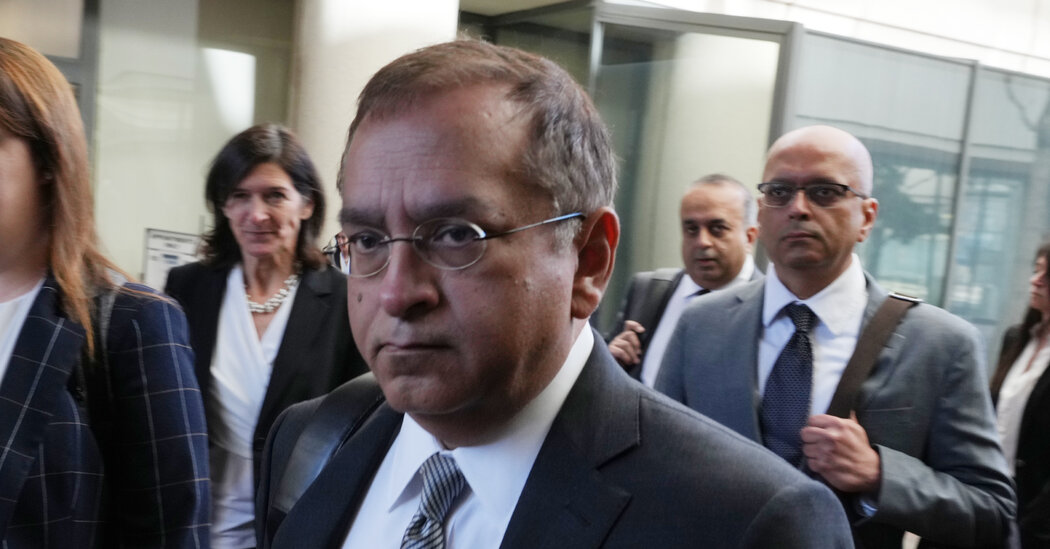Ramesh Balwani, the former chief operating officer of failed blood-testing startup Theranos, was sentenced to nearly 13 years in prison on Wednesday for defrauding investors and patients about the company’s business and technology.
Mr Balwani, 58, and his convicted co-conspirator, Elizabeth Holmes, 38, the founder of Theranos, had promised that the start-up would revolutionize healthcare with machines and tests that can detect some diseases with just a few drops of blood. But those claims were false, and Theranos became a story of Silicon Valley ambition and hype.
Mr Balwani, also known as Sunny, was convicted in July of 10 counts of wire fraud and two counts of conspiracy to commit wire fraud.
Judge Edward J. Davila of the US District Court for the Northern District of California sentenced Mr. Balwani to 155 months, which is 12 years and 11 months, as well as three years of supervised release. Mr Balwani is to surrender to custody on March 15.
His sentence was longer than that of Ms Holmes, who was found guilty of four counts of fraud in January and sentenced last month to more than 11 years in prison. Mr Balwani intends to appeal. His lawyers asked to be assigned to a minimum security satellite camp in Lompoc, California.
Although fraud carries a maximum penalty of 20 years in prison, prosecutors had requested that Mr Balwani be sentenced to 15 years and ordered to pay more than $800 million in restitution to investors. His lawyers had asked for probation.
As in Ms. Holmes’s case, prosecutors told Judge Davila that a lengthy sentence would discourage Silicon Valley entrepreneurs and startup founders from distorting the truth. In lawsuits, they also wrote that a long sentence would “restore the confidence investors should have when funding innovators.”
Epic rise and fall of Elizabeth Holmes
The story of the founder of Theranos, from a $9 billion valuation to a fraud conviction, symbolizes the pitfalls of Silicon Valley culture.
Jeffrey Schenk, a US assistant attorney and chief prosecutor, said in court on Wednesday that Mr Balwani should receive a longer sentence than Ms Holmes for overseeing Theranos’ lab, which endangered patients.
“Mr. Balwani had significant autonomy in running the lab. He made decisions that directly affected the information communicated to patients,” said Mr. Schenk. The lab, he added, was the source of “some of the greatest damage”.
Jeffrey Coopersmith, a lawyer for Mr Balwani, blamed Mrs Holmes, who was found not guilty of defrauding patients. “She was the CEO. She was the face of Theranos,” he said.
Mr Balwani, who appeared in court with his relatives, did not read a statement to the judge. No victims spoke.
Michael Weinstein, a former federal prosecutor who leads administrative litigation at the law firm of Cole Schotz, said Mr Balwani faced hurdles because he didn’t have “some of the same sympathies that Ms Holmes has”. He added that Mr Balwani “being a little bit older and wiser” meant “the court would expect more from him as an executive.”
Before Theranos, Mr. Balwani worked at software companies and helped run an e-commerce start-up, earning a $40 million payout at the height of the dot-com boom. He and Mrs. Holmes met when he was 37 and she was 18, and they secretly began dating shortly after Mrs. Holmes founded Theranos in 2003. Mr. Balwani joined the company and invested $4.6 million in it in 2009.
After The Wall Street Journal revealed in 2015 that Theranos’ tests didn’t work as advertised, Mr. Balwani left the company in 2016 and parted ways with Ms. Holmes. Theranos closed in 2018.
That year, federal prosecutors charged Mr. Balwani and Mrs. Holmes with fraud. Their cases were later separated and Mr Balwani went on trial this year.
Prosecutors argued at trial that he had known Theranos’ technology was not working as promised because he was entangled in nearly every part of the company. In addition to running the company’s lab, he created the financial projections and attended many meetings with investors.
Mr. Balwani’s lawyers argued that he was a strong supporter of Theranos and its mission. They said Mrs Holmes, not Mr Balwani, had been in charge.
Each defendant was often named in the other’s trial, but they did not testify against each other. In her trial, Ms. Holmes mr. Balwani of emotional and sexual abuse, which Mr. Balwani has denied and was not allowed as evidence in his trial.
Finally, a jury found Mr. Balwani guilty of defrauding Theranos investors and patients. After the conviction, he asked for a new trial, but was denied.
Ms Holmes, who will report to prison in April, this week announced her plans to appeal her case. In it, she quoted prosecutors’ various presentations about her relationship with Mr Balwani. The pair were presented as equals in her trial. But in Mr Balwani’s trial, her lawyers wrote, “the government took the opposite position, highlighting Mr Balwani’s age, experience and influence over Ms Holmes.”
Before handing down Mr Balwani’s sentence, Judge Davila reflected on Mr Balwani’s educational and business history and said the director’s previous successes made his actions at Theranos “tragic”.
“This was a successful business. The idea was strong,” Judge Davila said, referring to Theranos. But when problems arose at the company, he said, “Mr. Balwani chose to continue cheating.”
Erin Griffith reporting contributed.

